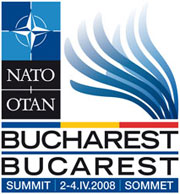
On the agenda
For the media
Opinions
More info
NATO Bucharest Summit
Agenda outline
Bucharest will be the biggest NATO Summit, given the number of partners and other international organisations who will be present. In this context, meetings with partners will be an integral part of the Summit, such as in the EAPC lunch, the NATO-Russia Council and the NATO-Ukraine Commission.
At Bucharest, Allied leaders will carry forward decisions taken at the Riga Summit and review the evolution of NATO’s main commitments, which are all mutually reinforcing. Heads of State and Government will assess the situation in Afghanistan and Kosovo, as well as in other regions where NATO is engaged. NATO’s operations and missions are a driving force for the transformation of the Alliance and, in parallel, demonstrate the ability of the Organization to project security and practise solidarity in very different circumstances.
Enlargement will also be high on the agenda with potential invitations for accession being made at the summit. This area of interest illustrates how a growing number of Euro-Atlantic countries consider the Alliance to be a fundamental platform where political consensus on transatlantic political and security issues can be transformed into action.
The Heads of State and Government will also look at broader issues of Euro-Atlantic integration, including how to deepen our engagement with our Partners, notably in the Western Balkans, and how to respond to their Euro-Atlantic aspirations.
Being able to sustain operations, together with the ability to confront security threats in an effective and unified way will also constitute major items on the summit agenda. Allied leaders will therefore review NATO’s capacity to provide forces for operations and examine ways and means of preparing for future security challenges.
- Turkey recognizes the Republic of Macedonia with its constitutional name.